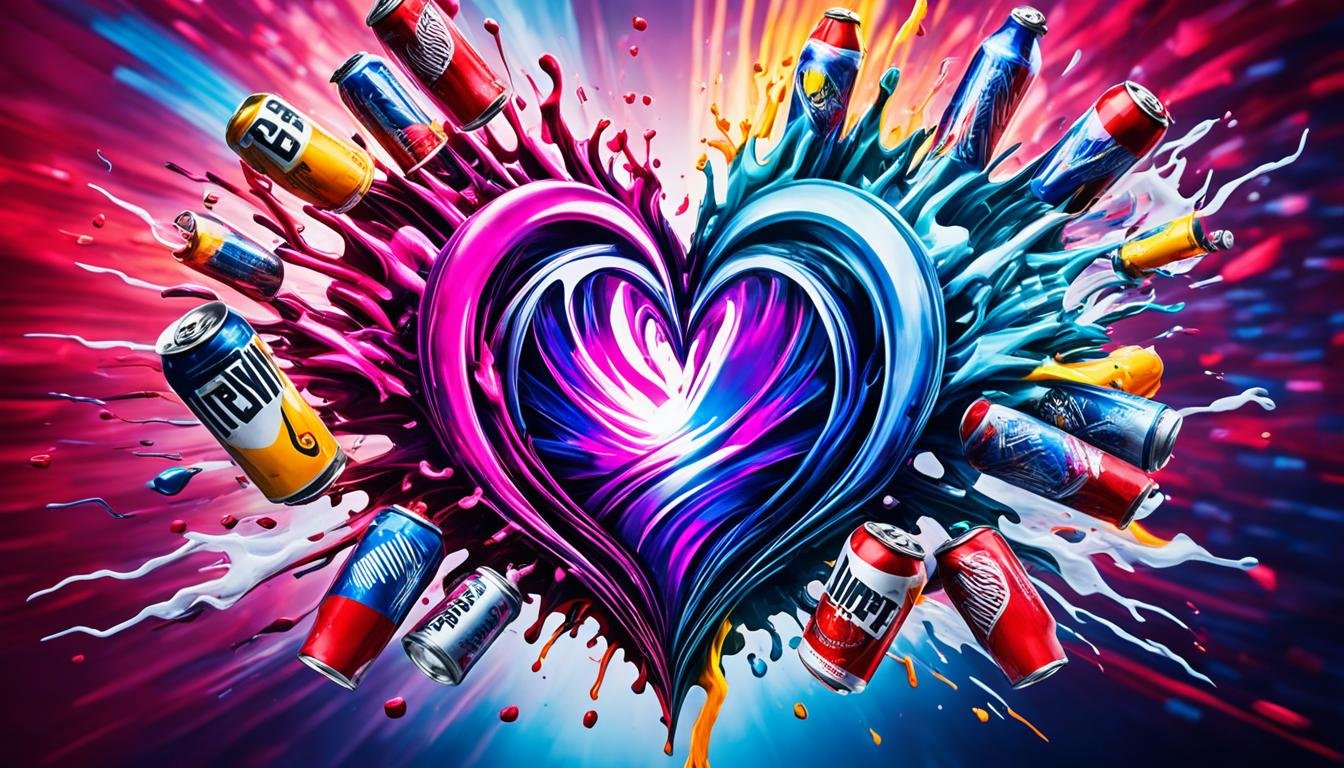Energy drinks For Heart Palpitations consumption has surged in popularity since the introduction of Red Bull in 1997. However, limited research has been conducted on the effects of energy drinks on heart palpitations and cardiovascular health, particularly among college students in the United States. In this article, we delve into the prevalence, frequency, and side effects of energy drink use among college students, aiming to shed light on the impact these beverages have on heart health.
Key Takeaways:
- Energy drink consumption among college students is widespread, with more than half reporting consuming more than one energy drink per month.
- Common reasons for energy drink consumption include insufficient sleep, increased energy, and partying with alcohol, but the frequency of jolt and crash episodes, headaches, and heart palpitations are also considerable.
- The primary constituent responsible for the energizing effects of energy drinks is caffeine, which can have both positive and negative effects on heart health.
- Energy drinks typically contain caffeine, herbal extracts, B vitamins, amino acids, and sugar derivatives, with varying caffeine content and increasing container sizes.
- Side effects of energy drink consumption include heart palpitations, insomnia, headaches, tremors, nausea and vomiting, and nervousness.
Energy Drink Consumption Patterns Among College Students
In a survey conducted with 496 randomly selected college students, it was found that a significant portion of the participants reported consuming energy drinks on a regular basis. Out of the surveyed individuals, 51% revealed that they consume more than one energy drink each month, highlighting the prevalence of energy drink consumption among college students.
When examining the reasons behind energy drink consumption, it was discovered that the majority of users turned to these beverages for specific purposes. Among the respondents, 67% indicated that they consume energy drinks to combat insufficient sleep, while 65% reported consuming them to boost their energy levels. Additionally, a significant proportion of college students, approximately 54%, admitted to consuming energy drinks alongside alcohol during social events and parties.
The survey also shed light on the frequency of certain side effects associated with energy drink consumption among college students. Approximately 29% of the participants experienced what is commonly referred to as “jolt and crash” episodes on a weekly basis. These episodes involve a sudden surge of energy followed by a subsequent energy crash. Moreover, 22% of the participants reported experiencing headaches as a result of energy drink consumption, while 19% experienced heart palpitations, a potentially alarming effect.
| Frequency of Side Effects | Percentage of College Students |
|---|---|
| Jolt and Crash Episodes (weekly) | 29% |
| Headaches | 22% |
| Heart Palpitations | 19% |
Effects of Caffeine in Energy Drinks on Heart Health
Caffeine is the primary constituent responsible for the energizing effects of energy drinks. While low doses of caffeine can improve cognitive performance and mood, high doses have been associated with adverse effects on heart health. Acute caffeine consumption can lead to increased heart rate, elevated blood pressure, and potentially serious heart conditions such as atrial fibrillation. Chronic caffeine ingestion has also been linked to central nervous system, cardiovascular, gastrointestinal, and renal dysfunction.
The stimulating effects of caffeine on the cardiovascular system can lead to changes in heart rate and rhythm. It acts as a stimulant on the central nervous system, aiding in alertness and wakefulness. However, excessive consumption of caffeine can have negative effects on heart health.
- Increased heart rate: Caffeine stimulates the release of adrenaline, which increases heart rate. This can make the heart work harder and potentially lead to palpitations or irregular heart rhythms.
- Elevated blood pressure: Caffeine can cause a temporary increase in blood pressure due to its stimulatory effects on the cardiovascular system.
- Potential for heart palpitations: Some individuals may experience heart palpitations after consuming energy drinks high in caffeine. These palpitations may feel like a fluttering sensation or an irregular heartbeat.
- Risk of atrial fibrillation: Atrial fibrillation is a condition characterized by an irregular and rapid heartbeat. Excessive consumption of caffeine, especially in susceptible individuals, may increase the risk of atrial fibrillation.
It is important to note that individual tolerances to caffeine vary. Some people may be more sensitive to its effects, while others may be able to tolerate higher doses without experiencing adverse cardiovascular symptoms.
Consumers should be mindful of their caffeine intake and consider the potential effects on heart health. If you experience any concerning symptoms, such as heart palpitations or changes in heart rate, it is advisable to consult a healthcare professional.
Caffeine Content in Popular Energy Drinks
| Energy Drink | Caffeine Content (mg) per 8 ounces |
|---|---|
| Red Bull | 80 |
| Monster | 160 |
| Rockstar | 160 |
| Bang Energy | 300 |
| 5-hour Energy | 200 |
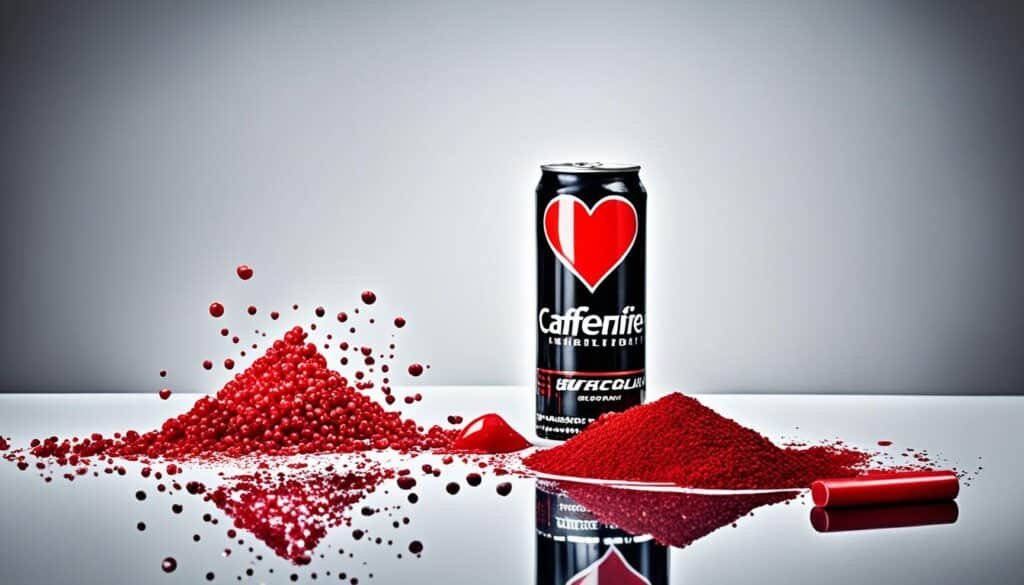
Ingredients and Caffeine Content of Energy Drinks
Energy drinks are a popular choice for those seeking a boost of energy and alertness. These beverages typically contain a combination of ingredients designed to provide a quick and lasting effect. Let’s take a closer look at the key components found in energy drinks and their caffeine content.
1. Caffeine
Caffeine is undoubtedly the star ingredient in energy drinks. It’s a natural stimulant that enhances focus and increases alertness. The caffeine content in energy drinks can vary, ranging from 80 to 141 mg per 8 ounces. To put that in context, it’s equivalent to the amount of caffeine found in five ounces of coffee or two 12-ounce cans of caffeinated soft drinks.
2. Herbal Extracts
Many energy drinks also contain herbal extracts known for their energy-boosting properties. Guarana, for example, is a plant extract that contains caffeine and other compounds that contribute to increased energy levels. Ginseng is another popular ingredient that is believed to enhance cognitive function and reduce fatigue.
3. B Vitamins and Amino Acids
B vitamins play a crucial role in cellular energy production. Energy drinks often contain B vitamins, such as B6 and B12, which are essential for metabolism and the production of red blood cells. Amino acids, particularly taurine, are also commonly added to energy drinks and are believed to improve physical performance.
4. Sugar Derivatives
While energy drinks are known for their ability to provide a quick energy boost, some of this effect can be attributed to the high sugar content. Sugar derivatives, such as glucose and sucrose, are often used to enhance the taste and sweetness of energy drinks.
It’s important to note that energy drinks can vary in their specific ingredients and formulations. Some may contain additional additives or natural extracts not mentioned here. It’s always a good idea to read the label and be aware of the ingredients in the particular energy drink you are consuming.
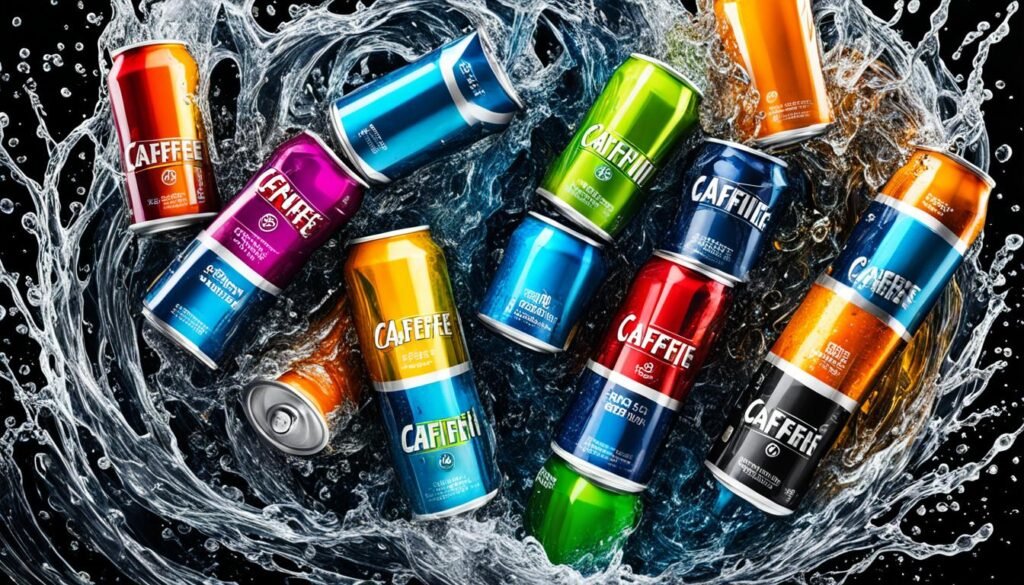
“Energy drinks are typically a mixture of caffeine, herbal extracts, B vitamins, amino acids, and sugar derivatives. The caffeine content in energy drinks can range from 80 to 141 mg per 8 ounces.”
Energy drinks have evolved over time, not only in terms of their ingredients but also their serving sizes. Some energy drinks now come in larger containers, offering up to 23 ounces per serving. This significant increase in size indicates the growing demand for higher energy drink consumption.
| Ingredient | Function |
|---|---|
| Caffeine | Stimulant, increases alertness |
| Herbal extracts (Guarana, Ginseng) | Energy-boosting properties, cognitive function improvement |
| B Vitamins | Cellular energy production, metabolism, red blood cell production |
| Amino Acids (Taurine) | Improved physical performance |
| Sugar Derivatives (Glucose, Sucrose) | Enhanced taste, sweetness |
Adverse Side Effects of Energy Drink Consumption
Consuming energy drinks can have various adverse side effects on the body. These effects are often attributed to the high caffeine content and other stimulants present in these beverages. It is important for consumers to be aware of the potential risks associated with energy drink consumption, including:
- Heart palpitations (20%)
- Insomnia (10%)
- Headaches (5.7%)
- Tremors (5.7%)
- Nausea and vomiting (4.2%)
- Nervousness (2.8%)
These side effects can vary in severity and may affect individuals differently. It is crucial to understand that excessive or frequent consumption of energy drinks can increase the likelihood of experiencing these side effects. The caffeine and stimulants in energy drinks can disrupt sleep patterns, elevate heart rate, and lead to headaches and other discomforts.
“Consuming energy drinks can lead to a range of side effects, from increased heart rate to insomnia and headaches. It is important to be mindful of these effects and consume these beverages in moderation.”
Individuals who are sensitive to caffeine or have underlying health conditions, such as cardiovascular issues, may be at a higher risk for experiencing these side effects. It is recommended to consult with healthcare professionals before consuming large amounts of energy drinks, especially if you are concerned about potential side effects.
Illustrative Example:
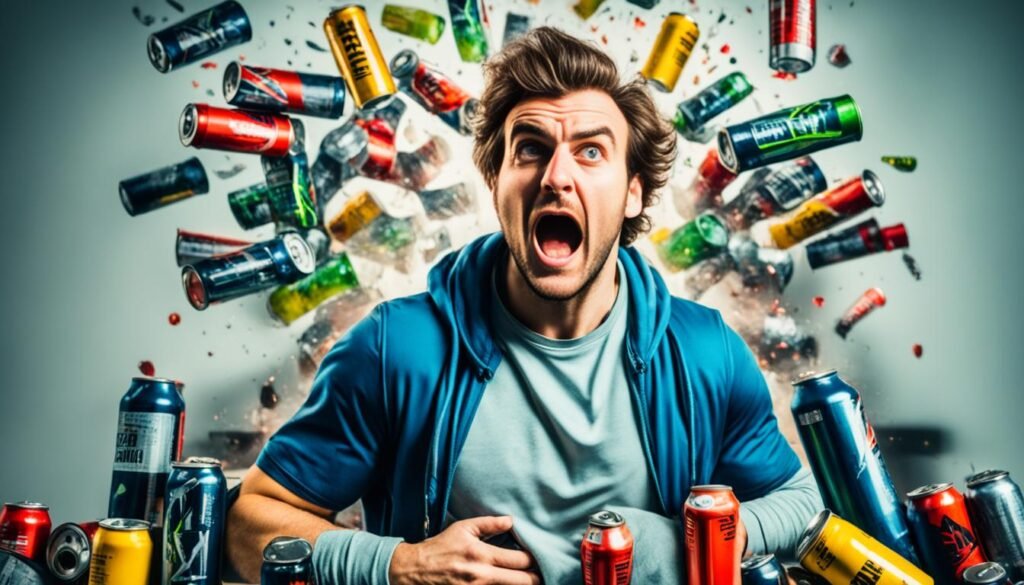
| Side Effects | Percentage of Energy Drink Consumers |
|---|---|
| Heart Palpitations | 20% |
| Insomnia | 10% |
| Headaches | 5.7% |
| Tremors | 5.7% |
| Nausea and Vomiting | 4.2% |
| Nervousness | 2.8% |
Energy Drinks and Mental Health
Research studies have found that the consumption of energy drinks may be associated with mental health issues such as stress, anxiety, and depression. However, it is important to note that most of the existing research has relied on cross-sectional designs, making it challenging to determine the causation or the direction of the effect.
Further longitudinal and intervention studies are needed to provide a more comprehensive understanding of the relationship between energy drinks and mental health. These studies would enable researchers to explore the long-term effects of energy drink consumption on mental well-being and better establish the association between energy drinks and mental health problems.
“While the association between energy drink consumption and mental health symptoms is evident, the nature of this relationship requires further investigation. More robust studies, including randomized controlled trials, are necessary to determine the influence of energy drinks on mental health.”
By conducting longitudinal studies that follow individuals over an extended period of time, researchers can better understand whether energy drink consumption leads to mental health problems or if people with existing mental health issues are more likely to consume energy drinks as self-medication.
The Need for Longitudinal Studies
Longitudinal studies would enable researchers to track the changes in mental health symptoms over time and establish a temporal relationship with energy drink consumption. This would provide more valuable insights into potential causal links between the two variables. Additionally, intervention studies would help determine if reducing or eliminating energy drink consumption could lead to improvements in mental health markers.
Also Read:- Power Up Your Progress: Best Energy Drinks For Weight Gain & Nutrition
It is also worth noting that individual differences and contextual factors may influence the impact of energy drinks on mental health. Factors such as genetic predisposition, underlying mental health conditions, and external stressors could all play a role. These complexities underscore the importance of conducting comprehensive research to tease apart the various contributing factors.
Prevalence of Energy Drink Consumption Among Medical Students
A study conducted among 257 medical students revealed valuable insights into the prevalence of energy drink consumption within this population. Out of the participants, 27.2% reported consuming at least one energy drink per month. Interestingly, male students were found to be more likely to consume energy drinks compared to their female counterparts.
The study also shed light on the motivations behind energy drink consumption among medical students. The primary reasons cited were to gain energy in general and to aid in studying for exams or completing projects. This aligns with the demanding nature of medical education, where students often resort to energy drinks as a quick fix for increasing alertness and combating fatigue.
However, it is crucial to be aware of the potential side effects associated with energy drink consumption. Approximately one-third of energy drink consumers in this study reported experiencing side effects. The most prevalent side effect among medical students was heart palpitations.
While energy drinks may provide a temporary boost in alertness, it is essential for medical students to weigh the potential risks and benefits before incorporating these beverages into their routine. Awareness of the prevalence and potential side effects can empower students to make informed decisions regarding energy drink consumption.
Side Effects of Energy Drink Consumption Among Medical Students
Energy drink consumption among medical students can have various side effects, highlighting the potential risks associated with their consumption, particularly among young adults.
Among medical students who consume energy drinks, the most common side effects include:
- Heart palpitations – reported by 20% of consumers
- Insomnia – experienced by 10% of consumers
- Headaches – reported by 5.7% of consumers
- Tremors – experienced by 5.7% of consumers
- Nausea and vomiting – reported by 4.2% of consumers
- Nervousness – experienced by 2.8% of consumers
These side effects can have a significant impact on the well-being and academic performance of medical students. It is crucial for them to be aware of the potential risks and exercise caution when consuming energy drinks.

As medical students often face high levels of stress and pressure, energy drink consumption may seem like a quick solution to increase energy and focus. However, it is important to consider the potential consequences and prioritize long-term health.
“The most common side effects of energy drink consumption among medical students are heart palpitations, insomnia, headaches, tremors, nausea and vomiting, and nervousness.”
Medical students should be encouraged to explore healthier alternatives to boost their energy levels, such as regular exercise, adequate sleep, and a balanced diet. Additionally, education on the potential risks of energy drink consumption, including the side effects mentioned above, should be a part of their training to ensure they can provide informed advice to their future patients.
Lack of Regulation and Education on Energy Drink Side Effects
When it comes to energy drinks, there is a concerning lack of regulation and proper education on their potential side effects. These beverages, often marketed as a quick fix for fatigue and improved performance, are freely available to consumers without any oversight. This lack of regulation means that the safety and long-term effects of energy drinks remain largely unknown.
One of the key issues is the limited education surrounding the risks associated with energy drink consumption. Many consumers, especially young adults, may not be fully aware of the potential dangers these drinks pose to their health. Without proper education, individuals may unknowingly put themselves at risk by consuming these beverages without understanding the potential side effects.
Increased public awareness and education efforts are vital to ensure that consumers can make informed decisions regarding energy drink consumption. By providing accurate and accessible information, individuals can understand the potential risks and make healthier choices for their well-being.
“Education is the most powerful weapon which you can use to change the world.” – Nelson Mandela
Awareness campaigns can play a crucial role in educating the public about the dangers of energy drinks. By emphasizing the negative effects and potential risks, these campaigns can promote responsible consumption and help individuals make informed choices about their health.
Why Regulation Matters
Regulation is necessary to ensure that energy drinks are held accountable for their ingredients and potential side effects. Currently, there are no specific regulations in place for energy drinks, allowing manufacturers to freely market and sell their products without any oversight. This lack of regulation makes it difficult for consumers to make informed decisions and for health authorities to monitor and address potential safety concerns.
Regulatory measures could include mandatory labeling requirements that clearly indicate the caffeine content and other stimulants present in energy drinks. By providing this information, consumers can be better informed about the potential risks and make choices based on their individual health circumstances.
Moreover, regulation can restrict the marketing and sales practices targeted towards young adults and adolescents, who are particularly susceptible to the enticing appeal of energy drinks. Implementing age restrictions and stricter guidelines for advertising can help protect vulnerable populations from potential harm.
The Need for Education
Educational initiatives are crucial in equipping individuals with the knowledge they need to make informed decisions about energy drink consumption. By providing accessible information about the potential side effects, risks, and healthier alternatives, education can empower consumers to prioritize their well-being.
Additionally, education can target schools, colleges, and healthcare providers to ensure that young adults and adolescents are aware of the risks associated with energy drinks. By integrating this knowledge into curricula and healthcare practices, we can foster a generation that understands the importance of making informed choices for their health.
| Regulation | Education | |
|---|---|---|
| Definition | Sets guidelines and standards for the production, marketing, and sale of energy drinks | Provides knowledge and information about the risks, side effects, and healthier alternatives |
| Importance | Ensures accountability and safety of energy drinks | Empowers individuals to make informed decisions |
| Implementation | Enforced by government bodies and regulatory agencies | Through awareness campaigns, educational programs, and integration into academic and healthcare systems |
It is essential to address the lack of regulation and education surrounding energy drinks to safeguard public health. By implementing regulations and educating consumers, we can create a society that is aware of the risks and empowered to make choices that prioritize their well-being.
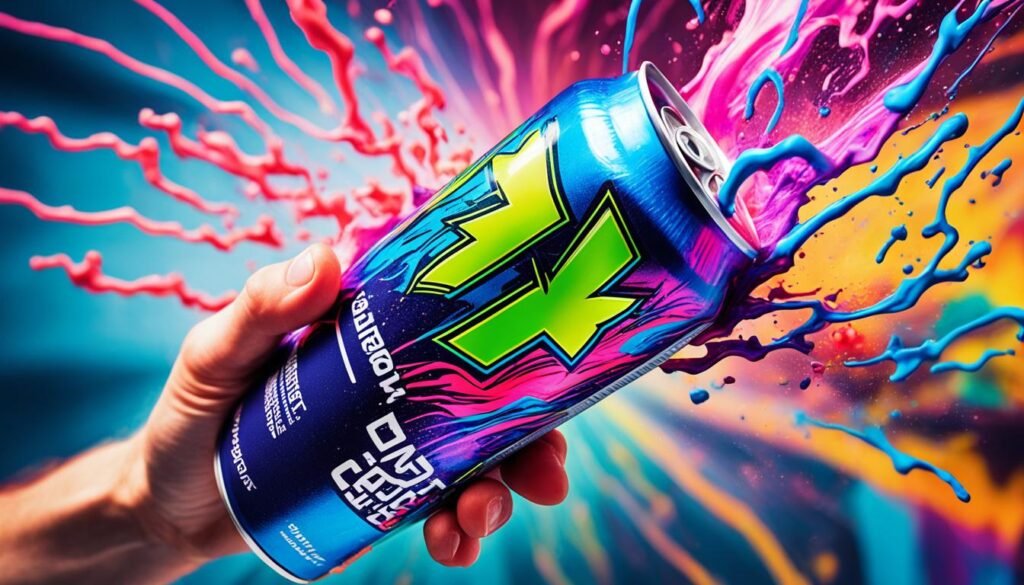 An image illustrating the potential side effects of energy drink consumption
An image illustrating the potential side effects of energy drink consumption
Recommendations for Public Awareness and Further Research
This article highlights the importance of public awareness campaigns to educate consumers about the potential risks associated with energy drink consumption. It is essential for individuals to make informed decisions regarding their health and well-being. Public awareness programs should focus on raising awareness about the adverse effects of energy drinks, particularly with respect to heart palpitations and other health concerns.
In addition, further research is needed to delve deeper into the impact of energy drink consumption on various aspects of individuals’ lives. One area that requires attention is gaining a better understanding of the educational level and knowledge of students who consume energy drinks. This research would provide insights into the factors driving the consumption patterns and behaviors of these individuals.
Furthermore, there is a need for comprehensive studies to explore the long-term effects of energy drink consumption on cardiovascular health and mental well-being. Understanding the potential risks and consequences of regular energy drink consumption can help individuals make informed choices and take necessary precautions to protect their health.
In summary, raising public awareness and conducting further research are crucial steps in addressing the potential risks associated with energy drink consumption. By educating consumers and gaining deeper insights into the effects of these beverages, we can promote healthier habits and protect the well-being of individuals.
Conclusion
In conclusion, the consumption of energy drinks among college students and medical students is widespread, but it comes with potential side effects, particularly heart palpitations. These side effects can be attributed to the high caffeine content and other stimulants present in energy drinks. It is essential for consumers to be aware of the risks and make informed decisions about their consumption.
Public awareness and education are vital in addressing the issue of energy drink-related side effects. It is crucial to provide accurate information about the potential risks and encourage responsible consumption. This includes educating students on the recommended daily caffeine intake and promoting healthier alternatives to boost energy levels.
Further research is necessary to better understand the long-term effects and risks associated with energy drinks. This includes assessing the impact of consistent and excessive consumption on cardiovascular health and mental well-being. Additionally, studies on the effectiveness of regulations and warning labels can guide policymakers in implementing measures to protect consumers.
FAQs
Q: What are the potential risks of energy drinks for heart health?
A: Energy drinks contain high doses of caffeine and other ingredients that may affect the heart, leading to increased risks of heart palpitations, rapid heart rate, and arrhythmia.
Q: Can excessive energy drink consumption contribute to heart palpitations?
A: Yes, excessive consumption of energy drinks, especially those with high levels of caffeine, may contribute to heart palpitations and can potentially trigger heart arrhythmias.
Q: Are energy drinks linked to heart disease?
A: Yes, research indicates that the ingredients in energy drinks may contribute to an increased risk of heart disease, including coronary heart disease and high blood pressure.
Q: Should individuals with atrial fibrillation avoid energy drinks?
A: Yes, individuals with atrial fibrillation or other cardiovascular issues should avoid consuming energy drinks, as the ingredients in these beverages may negatively affect the heart and blood pressure.
Q: What are the health effects of energy drinks on the heart?
A: Energy drinks may have detrimental effects on heart health, potentially leading to an increased risk of heart palpitations, arrhythmias, and other cardiovascular complications.
Q: How do energy drinks impact the heart and blood pressure?
A: The high levels of caffeine and other stimulants in energy drinks may have an adverse impact on the heart and blood pressure, potentially causing rapid heart rate and elevated blood pressure levels.
Q: Are there specific groups of people who should avoid energy drinks due to heart-related concerns?
A: Yes, individuals with existing heart conditions, high blood pressure, or a history of heart disease should avoid consuming energy drinks to mitigate potential risks to their heart health.
